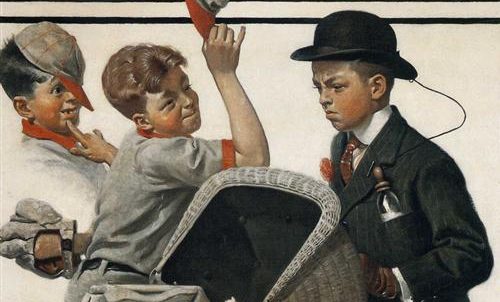
“Without thinking too much about it in specific terms, I was showing the America I knew and observed to others who might not have noticed. My fundamental purpose is to interpret the typical American. I am a storyteller.”
—Norman Rockwell
The ideology of the American dream was enriched in popular culture after the rapid development of American society due to World Wars One and Two. It is also the center point of much artwork from Rockwell, as he is commonly praised for his idyllic and intriguing narrative style that always attracts and brings the audience back to the simplistic and comfortable American life he observed during the fifty years of his propagandist career at the Saturday Evening Post. However, in 2019, one woman cuts the fantasy he outmoded with a simple word and an exclamation mark: “Fu##ing!”.
The appearance of Lana Del Rey was a weird phenomenon in mainstream music back when it was the prime of electronic music. Due to the quick spread of the internet, her music was given a chance to become popular, but at the same time, she also left her indelible impression on the world as a sad girl, a doll that can’t sing, and also an industry plant that is not authentic. Seven years later, those doubts did reduce, but still appeared in the criticism of her music, until the release of her complex fifth album, “Norman Fu##ing Rockwell!”
“You took my sadness out of context, at the Mariners apartment complex. I ain’t no candle in the wind.” Del Rey directly states this on the second track of the album. The quote seems to be addressing the bonding of this sad girl personality with herself during the start of her career, even though she refuses the argument that it is related to her relationship with the public’s observation but instead to a personal experience in a BBC radio interview. She complained to the interviewer, saying that she had a different viewpoint on sadness than other people in her life. This statement is also stressed in other tracks in this album, for example, “Venice Bitc#” and the title track, which both associate with lyrics like “Paint me happy in blue,” as the color was known to be a symbol that represented sadness, but it has an opposite value in Del Rey’s mind. The line “happy in blue” draws attention to the topic of affection in this album. Even though topics like love seem to be an eternal theme in Del Rey’s music, love in NFR is a slightly different from her early works and mindset, as it portrays a warm side of her affection, making it a continuation of her previous album “Lust For Life,” which emphasized the feelings of both people instead of the individual perspective expressed on albums like Born To Die and Ultraviolence. The warmth from her lyric and voice is what makes us sense her maturity, making it a statement stronger than any impulsive expression and what I believe is more closer to the idea of feminism.
Just like how Rockwell outmoded his fantasy of American life from his observation, Lana puts up her pieces of the American dream from her life perspective and creates melodies that lead her listeners back to the American life she lives in. While it grows and glistens, as her emotion and experience pour in until it burns out and vanishes, like the wildfire she mentioned in both, “The greatest,” and the cover of the album. “The culture is lit and I had a ball, I guess that I’m burned out after all.” She sings on the outro of, “The greatest,” that represents the loss of the culture she grew up in—the culture that she missed that once gleamed.
As her personal emotion and reflection fill up the fantasy she creates for her audience, her expression of deep concern for the future of this nation, specifically on the track, “hope is a dangerous thing for a woman like me to have—but I have it,” in which she sings, “A modern-day woman with a weak constitution, ‘cause I’ve got monsters still under my bed that I could never fight off,” which is targeted on the election of Trump as the 45th president of the United States, who was famously known for his opinion of Male Superiority. But instead of disappointment, Lana still states she has hope for the future and for the betterment of the nation. As she eulogizes the current revolution and evolution of American culture and herself, those critics of her authenticity become rather inaccurate.
